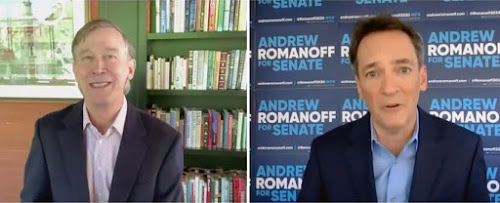 |
| April Zesbaugh, Floyd Ciruli and Marty Lenz |
Although the race became intense the last month and millions of dollars in advertising expended, the sense remains that John Hickenlooper has the final advantage.
High-Profile Race
This primary became surprisingly competitive and high-profile. It was in the New York Times this weekend, and recently the Washington Post, Politico, the AP and The Hill. John Hickenlooper, as the two-term, well liked former governor, was slated to win. But, missteps with ethics violations and misstatements on race issues put him on the defense. His debate performances the last three weeks were weak and the sense was that the momentum had shifted to his underdog challenger, Andrew Romanoff.
Hickenlooper Starts Campaigning
Hickenlooper finally started campaigning after being attacked by a negative and broadly criticized campaign commercial from Romanoff and two million dollars in negative ads from the national Republicans and incumbent Senator Cory Gardner. Hickenlooper, a prodigious fundraiser, spent more than three million dollars in defense with funds from the national Democratic Senate PAC and negative ads from an independent non-disclosed group. He emphasized endorsements from progressive national figures Elizabeth Warren, Cory Booker, Kamala Harris and local officials trying to shore up perceived weakness.
Poll Shows Hickenlooper Easy Winner
A recent non-probability poll showed Hickenlooper ahead by 30 points. The race is most likely much closer, but the poll did contain some other good news for Hickenlooper:
- Most Democrats believe he is the strongest candidate against Gardner – a top goal of Democrats
- They didn’t think he was unethical, but an ethical politician who had made mistakes (like most politicians)
- They didn’t believe he was too far right or left, but well-positioned
- Few Democrats knew much about Romanoff
As of this weekend, more than 1 million ballots had been returned. In recent history, the last two days will produce huge returns, depending on the level of final voter interest and ballot chasing efforts of the campaigns toward the late voters, many unaffiliated, younger and new to the state.
Wins and Losses from Primary
If Hickenlooper survives the primary, it will have been a wake-up call that, although it may be a Democratic year in Colorado, the election will not be a walk in the park. Hickenlooper will also have been validated by Colorado Democrats, which was needed to stop being just a Chuck Schumer candidate. He will also be seen as the moderate having distinguished himself from the most liberal wing of the party. But he was damaged, handing the Republicans a new issue and highlighting his weak debating ability.
Of course, the Republicans preferred Romanoff. They wanted the most liberal candidate they could get having already campaigned against the socialists.
The primary still has many voters casting their ballots and it has reminded observers that there is a long time until November and many surprises awaiting us.







































